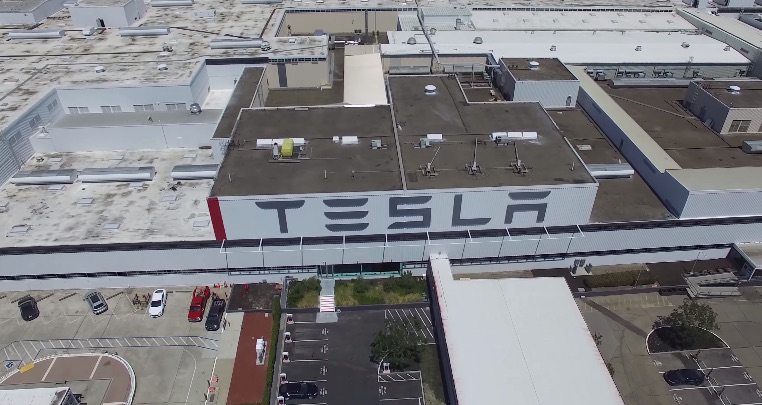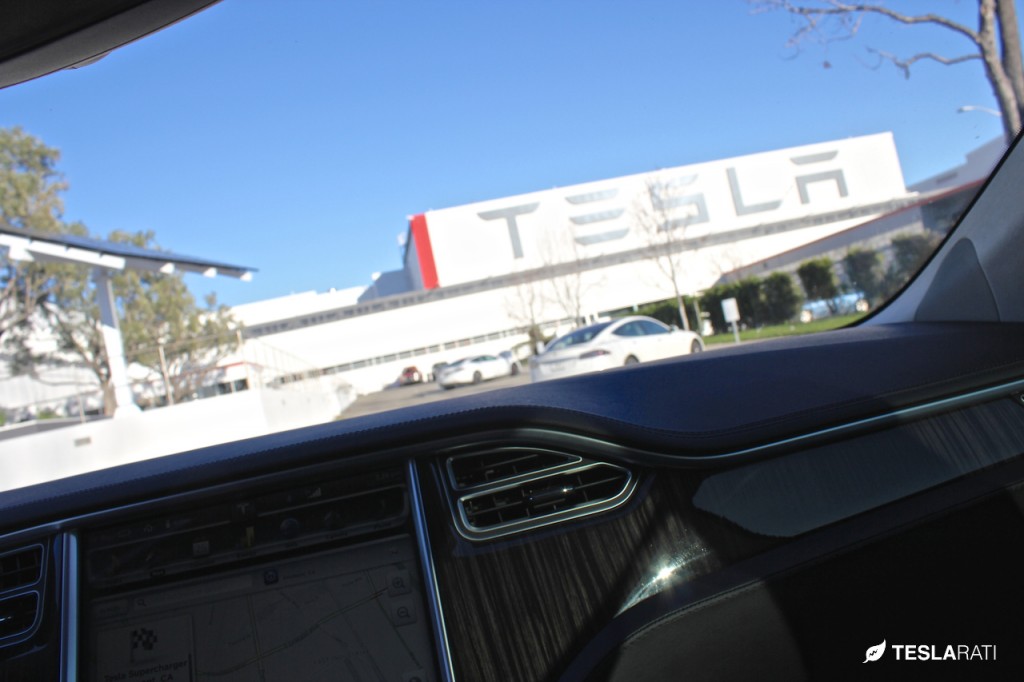News
Tesla implicated in foreign worker scandal after reports of visa violations
The San Jose Mercury finds that up to 140 low wage workers were used to build the new Tesla paint shop at the Fremont factory. They were supplied with phony B1/B2 visas by foreign companies.

Updated: Tesla has issued a response to the story which can be seen here.
Tesla is justly proud of its new state-of-the-art painting facility capable of scaling up to 500,000 vehicles per year at the Fremont factory, but a report coming from the San Jose Mercury published on May 15 says that underpaid foreign workers contributed to the construction of the paint shop violating terms of their B1/B2 visas.
The Mercury began its investigation after Gregor Lesnik, a native of Slovenia who worked on the expansion of Tesla’s multimillion dollar Fremont factory paint shop in 2015, filed suit against Tesla and several other defendants. Lesnik was seriously injured while working on the paint shop project after slipping on loose tile and falling three stories before breaking both legs, ribs, and sustaining a concussion.
The newspaper reports that in 2014, Lesnik was an unemployed electrician living with his mother in Velenje, Slovenia. His girlfriend was expecting their first child and money was tight. He saw an ad seeking workers placed by ISM Vuzen, a construction company located in Slovenia. Vuzem provides teams of Eastern European workers to build manufacturing plants in Europe and the U.S. Among its clients are Mercedes-Benz, Toyota, Volkswagen, Ford, and Saab.
In March, 2015, Tesla selected Eisenmann, a German-based manufacturer of industrial systems, to expand the Fremont paint shop. Eisenmann claimed it was the most valuable contract in its history at $100 million. Soon it began hiring subcontractors to fill out the work force for the project. It turned to Vuzen for some of those workers.
Vuzen helped Lesnik apply for a US visa. Eisenmann assisted. Robert Keller, its US purchasing manager based out of Chicago, was listed as Lesnik’s U.S. contact. After Lesnik filed his lawsuit, Eisenmann denied that it had any legal responsibility for him.
US immigration officials were told that Lesnik was a supervisor with specialized training who would be working at a paint shop for a BMW factory in South Carolina. Keller told INS in a letter that Lesnik was a “supervisor of electrical and mechanical installation. His assignment will involve multiple border entries,” Keller wrote, “but in no way adversely affect the employment of citizens of the United States.”
That couldn’t be further from the truth, says Rob Stoker, president of the Building and Construction Trades Council of Alameda County. “There’s definitely something wrong with this picture.” He claims a local company lost the bid on the Tesla project party because their labor costs were higher. The job would have meant tens of thousands of work hours and valuable training for local apprentices. “It killed us,” Stoker said. “We had so many people — ready, willing and able — needing this.”
For Lesnik and his fellow employees provided by Vuzen, the work in Fremont paid an average of $5 an hour with no benefits. They often worked 12 hour days, sometimes 7 days a week. He claims that Tesla employees who he worked side by side with were earning up to 10 times as much.
Tesla denies any responsibility for Lesnik, his injuries, or his immigration status. A company spokesperson told the Mercury, “Tesla expects all its contractors and their subs … to comply with all applicable pay laws.” Of course they do. But the real question is, how closely do they look at the status of people working at their facilities?
As with similar worker abuse issues that have beset other companies, such as Apple’s troubles with Foxconn, it is one thing to have high expectations. It is quite another to take adequate steps to ensure those expectations are met. All too often, it is easier to look the other way, especially when millions of dollars are involved.
Source and photo credit: San Jose Mercury

News
Tesla ships out update that brings massive change to two big features
“This change only updates the name of certain features and text in your vehicle,” the company wrote in Release Notes for the update, “and does not change the way your features behave.”

Tesla has shipped out an update for its vehicles that was caused specifically by a California lawsuit that threatened the company’s ability to sell cars because of how it named its driver assistance suite.
Tesla shipped out Software Update 2026.2.9 starting last week; we received it already, and it only brings a few minor changes, mostly related to how things are referenced.
“This change only updates the name of certain features and text in your vehicle,” the company wrote in Release Notes for the update, “and does not change the way your features behave.”
The following changes came to Tesla vehicles in the update:
- Navigate on Autopilot has now been renamed to Navigate on Autosteer
- FSD Computer has been renamed to AI Computer
Tesla faced a 30-day sales suspension in California after the state’s Department of Motor Vehicles stated the company had to come into compliance regarding the marketing of its automated driving features.
The agency confirmed on February 18 that it had taken a “corrective action” to resolve the issue. That corrective action was renaming certain parts of its ADAS.
Tesla discontinued its standalone Autopilot offering in January and ramped up the marketing of Full Self-Driving Supervised. Tesla had said on X that the issue with naming “was a ‘consumer protection’ order about the use of the term ‘Autopilot’ in a case where not one single customer came forward to say there’s a problem.”
This was a “consumer protection” order about the use of the term “Autopilot” in a case where not one single customer came forward to say there’s a problem.
Sales in California will continue uninterrupted.
— Tesla North America (@tesla_na) December 17, 2025
It is now compliant with the wishes of the California DMV, and we’re all dealing with it now.
This was the first primary dispute over the terminology of Full Self-Driving, but it has undergone some scrutiny at the federal level, as some government officials have claimed the suite has “deceptive” names. Previous Transportation Secretary Pete Buttigieg was one of those federal-level employees who had an issue with the names “Autopilot” and “Full Self-Driving.”
Tesla sued the California DMV over the ruling last week.
News
Tesla workers push back against Giga Berlin unionization
“IG Metall did not succeed in Giga Berlin‘s works council election earlier today. The union share was reduced from nearly 40% in 2024 to 31% in 2026! This is a clear message by the Giga Berlin team towards an independent co-determination! The list called Giga United, led by the current chairwoman, Michaela Schmitz, received the most votes with more than 40%! Good news for Giga Berlin!”

Tesla workers pushed back against unionization efforts at Gigafactory Berlin, and over the past few years, there has been a dramatic decrease in interest to unionize at the German plant.
Gigafactory Berlin Plant Manager André Thierig announced on Wednesday that IG Metall, the European union group, saw its share reduce from 40 to 31 percent in 2026 as employees eligible to vote on the issue. Instead, the Giga Berlin team, known as Giga United, received the most votes with more than 40 percent.
BREAKING! 🚨
IG Metall did not succeed in Giga Berlin‘s works council election earlier today. The union share was reduced from nearly 40% in 2024 to 31% in 2026!
This is a clear message by theGiga Berlin team towards an independent co-determination!
The list called Giga…
— André Thierig (@AndrThie) March 4, 2026
Thierig gave specific details in a post on X:
“IG Metall did not succeed in Giga Berlin‘s works council election earlier today. The union share was reduced from nearly 40% in 2024 to 31% in 2026! This is a clear message by the Giga Berlin team towards an independent co-determination! The list called Giga United, led by the current chairwoman, Michaela Schmitz, received the most votes with more than 40%! Good news for Giga Berlin!”
There were over 10,700 total employees who were eligible to vote, with 87 percent of them turning out to cast what they wanted. There were three key outcomes: Giga United, IG Metall, and other notable groups, with the most popular being the Polish Initiative.
The 37-seat council remains dominated by non-unionized representatives, preserving Giga Berlin as Germany’s only major auto plant without a collective bargaining agreement.
Thierig and Tesla framed the outcome as employee support for an “independent, flexible, and unbureaucratic” future, enabling acceleration on projects like potential expansions or new models. IG Metall expressed disappointment, accusing management of intimidation tactics and an “unfair” campaign.
The first election of this nature happened back in 2022. In 2024, IG Metall emerged as the largest single faction with 39.4 percent, but non-union lists coalesced for a majority.
But this year was different. There was some extra tension at Giga Berlin this year, as just two weeks ago, an IG Metall rep was accused by Tesla of secretly recording a council meeting. The group countersued for defamation.
Tesla Giga Berlin plant manager faces defamation probe after IG Metall union complaint
This result from the 2026 vote reinforced Tesla’s model of direct employee-management alignment over traditional German union structures, amid ongoing debates about working conditions. IG Metall views it as a setback but continues advocacy. Tesla sees it as validation of its approach in a competitive EV market.
This outcome may influence future labor dynamics at Giga Berlin, including any revival of expansion plans or product lines, which Musk has talked about recently.
News
SpaceX President Gwynne Shotwell details xAI power pledge at White House event
The commitment was announced during an event with United States President Donald Trump.

SpaceX President Gwynne Shotwell stated that xAI will develop 1.2 gigawatts of power at its Memphis-area AI supercomputer site as part of the White House’s new “Ratepayer Protection Pledge.”
The commitment was announced during an event with United States President Donald Trump.
During the White House event, Shotwell stated that xAI’s AI data center near Memphis would include a major energy installation designed to support the facility’s power needs.
“As you know, xAI builds huge supercomputers and data centers and we build them fast. Currently, we’re building one on the Tennessee-Mississippi state line. As part of today’s commitment, we will take extensive additional steps to continue to reduce the costs of electricity for our neighbors…
“xAI will therefore commit to develop 1.2 GW of power as our supercomputer’s primary power source. That will be for every additional data center as well. We will expand what is already the largest global Megapack power installation in the world,” Shotwell said.
She added that the system would provide significant backup power capacity.
“The installation will provide enough backup power to power the city of Memphis, and more than sufficient energy to power the town of Southaven, Mississippi where the data center resides. We will build new substations and invest in electrical infrastructure to provide stability to the area’s grid.”
Shotwell also noted that xAI will be supporting the area’s water supply as well.
“We haven’t talked about it yet, but this is actually quite important. We will build state-of-the-art water recycling plants that will protect approximately 4.7 billion gallons of water from the Memphis aquifer each year. And we will employ thousands of American workers from around the city of Memphis on both sides of the TN-MS border,” she noted.
The Ratepayer Protection Pledge was introduced as part of the federal government’s effort to address concerns about rising electricity costs tied to large AI data centers, as noted in an Insider report. Under the agreement, companies developing major AI infrastructure projects committed to covering their own power generation needs and avoiding additional costs for local ratepayers.










